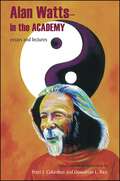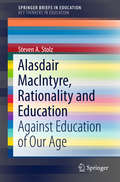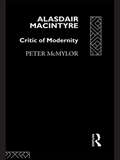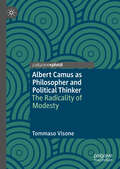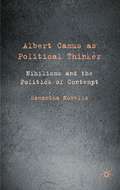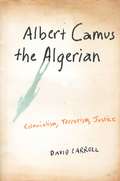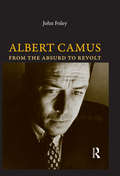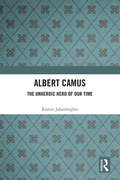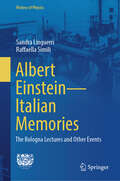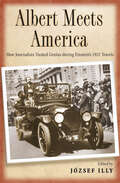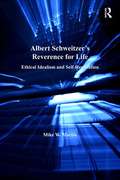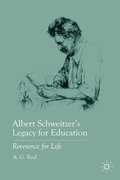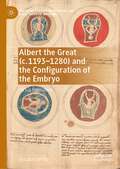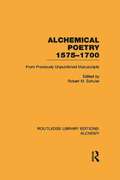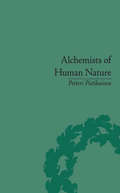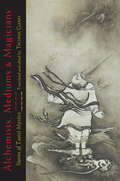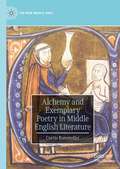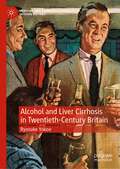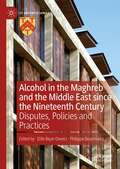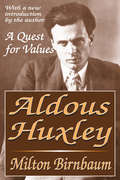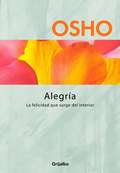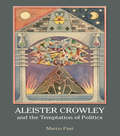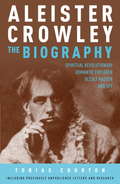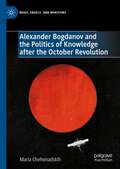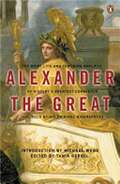- Table View
- List View
Alan Watts - In the Academy: Essays and Lectures (SUNY series in Transpersonal and Humanistic Psychology)
by Alan WattsGold Winner, 2017 Foreword INDIES Book of the Year Awards in the Philosophy categoryTo commemorate the 2015 centenary of the birth of Alan Watts (1915–1973), Peter J. Columbus and Donadrian L. Rice have assembled a much-needed collection of Watts's scholarly essays and lectures. Compiled from professional journals, monographs, scholarly books, conferences, and symposia proceedings, the volume sheds valuable light on the developmental arc of Watts's thinking about language and mysticism, Buddhism and Zen, Christianity, comparative religion, psychedelics, and psychology and psychotherapy. This definitive collection challenges Watts's reputation as a "popularizer" or "philosophical entertainer," revealing his concerns to be much more expansive and transdisciplinary than is suggested by the parochial "Zen Buddhist" label commonly affixed to his writings. The editors' authoritative introduction elucidates contemporary perspectives on Watts's life and work, and supports a bold rethinking of his contributions to psychology, philosophy, and religion.
Alasdair MacIntyre, Rationality and Education: Against Education of Our Age (SpringerBriefs in Education)
by Steven A. StolzDespite Alasdair MacIntyre being known as an academic who has made many notable contributions to a range of areas in philosophy, his thinking on education is not as well-known and/or properly understood by most audiences and readerships that predominantly reside in educational contexts. With this in mind, this book aims to provide a critique of MacIntyre’s thinking about education, and hence commences with a central theme found in MacIntyre’s extensive corpus concerning the fragmentation and disunification of ideas found in our culture and society that stems both from the rejection of metaphysics and what it means to be a human being living within the context of history. According to MacIntyre, part of the problem why this has occurred is due to educational institutions, particularly universities failing to resist the pressure exerted from industry and the state to conform. Unfortunately, this has resulted in a type of intellectual dissensus where the shared conceptions of rational enquiry and the role of reason have been replaced by pluralistic notions of private and personal choices concerning the good, and a disillusionment with reason that is ultimately exhibited as apathy and conformism. In order to overcome this apathy and conformism found in our culture and society, MacIntyre’s educational project is concerned with the cultivation of rationality; however, this is not an easy undertaking because it involves students being confronted with alternative – sometimes rather hostile – rival traditions so they both come to see rival points of view and understand that each tradition, including their own, does not come from a neutral or value-neutral standpoint. To MacIntyre, dialectical encounters between traditions is a crucial starting point of a good education, but for intellectual and academic progress to be made, rational enquiry needs to be grounded in a shared understanding of first principles that aims at truth and rational vindication. It is this shift in thinking that is of interest in the latter part of this book, particularly MacIntyre’s views around tradition-orientated communities of practice. Here, MacIntyre is concerned with the praxis of his educational project and the crucial role tradition-orientated communities play in the cultivation of independent reasoners who are capable of seeing the interconnectedness between different forms of knowledge that can lead us to an informed discovery of both the truth, and of the good, but most importantly exhibit virtuous dispositions which are vital to good practical reasoning.
Alasdair MacIntyre: Critic of Modernity
by Peter McMylorThis book is the first full length account of the significance of MacIntyre's work for the social sciences. MacIntyre's moral philosophy is shown to provide the resources for a powerful crititque of liberalism. His dicussion of the managerist and emotivist roots of modern culture is seen as the inspiration for a critical social science of Modernity
Albert Camus as Philosopher and Political Thinker: The Radicality of Modesty
by Tommaso VisoneThis book explores the role of modesty in the thought of Albert Camus. Camusian modesty – modestie – affirms, against nihilism and absolutism, the necessity of taking care and putting passion into the relativity of human creation and recreation. The book shows how this care and passion spring from the necessity of a continually renewed tension between the self and the limits which transcend the self. From this standpoint, modesty is not a form of moderation; it goes to the root of human condition in face of the absurd. It is a radical attitude which engages human life in a daily struggle for meaning. With modesty in mind, Camus reimagined the relation between meaning and absurdity, history and nature, self and other, nation state and continent, global north and south, and war and peace. In a world of arrogance, narcissism, and fear, Camus’ philosophical and political insights are fundamental in order to re-think and re-imagine our present.
Albert Camus as Political Thinker
by Samantha NovelloAn intense genealogical reconstruction of Camus's political thinking challenging the philosophical import of his writings as providing an alternative, aesthetic understanding of politics, political action and freedom outside and against the nihilistic categories of modern political philosophy and the contemporary politics of contempt and terrorisms
Albert Camus the Algerian: Colonialism, Terrorism, Justice
by David CarrollIn these original readings of Albert Camus' novels, short stories, and political essays, David Carroll concentrates on Camus' conflicted relationship with his Algerian background and finds important critical insights into questions of justice, the effects of colonial oppression, and the deadly cycle of terrorism and counterterrorism that characterized the Algerian War and continues to surface in the devastation of postcolonial wars today. During France's "dirty war" in Algeria, Camus called for an end to the violence perpetrated against civilians by both France and the Algerian National Liberation Front (FLN) and supported the creation of a postcolonial, multicultural, and democratic Algeria. His position was rejected by most of his contemporaries on the Left and has, ironically, earned him the title of colonialist sympathizer as well as the scorn of important postcolonial critics. Carroll rescues Camus' work from such criticism by emphasizing the Algerian dimensions of his literary and philosophical texts and by highlighting in his novels and short stories his understanding of both the injustice of colonialism and the tragic nature of Algeria's struggle for independence. <P><P>By refusing to accept that the sacrifice of innocent human lives can ever be justified, even in the pursuit of noble political goals, and by rejecting simple, ideological binaries (West vs. East, Christian vs. Muslim, "us" vs. "them," good vs. evil), Camus' work offers an alternative to the stark choices that characterized his troubled times and continue to define our own. "What they didn't like, was the Algerian, in him," Camus wrote of his fictional double in The First Man. Not only should "the Algerian" in Camus be "liked," Carroll argues, but the Algerian dimensions of his literary and political texts constitute a crucial part of their continuing interest. Carroll's reading also shows why Camus' critical perspective has much to contribute to contemporary debates stemming from the global "war on terror."
Albert Camus: From the Absurd to Revolt
by John FoleyAdopting an interdisciplinary approach, encompassing philosophy, literature, politics and history, John Foley examines the full breadth of Camus' ideas to provide a comprehensive and rigorous study of his political and philosophical thought and a significant contribution to a range of debates current in Camus research. Foley argues that the coherence of Camus' thought can best be understood through a thorough understanding of the concepts of 'the absurd' and 'revolt' as well as the relation between them. This book includes a detailed discussion of Camus' writings for the newspaper "Combat", a systematic analysis of Camus' discussion of the moral legitimacy of political violence and terrorism, a reassessment of the prevailing postcolonial critique of Camus' humanism, and a sustained analysis of Camus' most important and frequently neglected work, "L'Homme revolte" (The Rebel).
Albert Camus: The Unheroic Hero of Our Time
by Ramin JahanbeglooThis book interprets the ideas, thoughts and concepts that characterize the writings and philosophy of Albert Camus for our contemporary times. It investigates Camus’ "revolted compassion" as an outsider and a philosopher-writer who in his own words believed in "creating dangerously". The author examines Camus’ interventions on political, philosophical and moral questions, such as Algerian independence, capital punishment, ideological violence, nihilism in the context of his ideals of the absurd and revolt, and justice and liberty. Further, it goes on to provide an exhaustive analysis of Camus’ critique of violence and his intellectual resistance to totalitarianism. Bringing together latest scholarship with an acute analysis of Albert Camus’ philosophy, this sourcebook throws a powerful light on the intellectual foundations of the twentieth century and its relevance for the twenty-first. The book will be of interest to scholars of literature, philosophy and African Studies.
Albert Einstein—Italian Memories: The Bologna Lectures and Other Events (History of Physics)
by Sandra Linguerri Raffaella Simili (deceased)This book is dedicated to Einstein’s personal and scientific relationships with Italy, which began as early as adolescence and continued over various stages of his life. It collects together a wealth of historical documentation including the letters in which Einstein recalls having lived as a young man with his family in Lombardy, Pavia and Milan; the texts of three lectures delivered by Einstein in Italian in October 1921 in Bologna at the invitation of the mathematician Federigo Enriques, the only lectures he held in Italy; the correspondence with Enriques and other Italian intellectuals, together with the letter that Einstein sent in 1931 to the Minister of Justice Alfredo Rocco to try to avoid the infamy of the oath of allegiance to the fascist regime imposed by Mussolini on university professors. The book closes with some writings on relativity from 1907 to 1914 (Einstein, Abraham, Corbino, Castelnuovo) and the 1920s debate between pro-relativists and anti-relativists publishedin the international journal “Scientia”, founded in 1907 by Enriques.
Albert Meets America: How Journalists Treated Genius during Einstein's 1921 Travels
by József IllyIn 1919, newspaper headlines said that a British expedition had confirmed Einstein's general theory of relativity. The news stirred the public imagination on both sides of the Atlantic and thrust the scientist into the spotlight of fame. Two years later, Chaim Weizmann led a fund-raising mission to the United States and invited Einstein to join it. The mission traveled to New York, Boston, Chicago, Cleveland, Philadelphia, and Hartford to campaign for public awareness and support of the Hebrew University of Jerusalem. This brought Einstein within the grasp of the American media. His lectures delivered in New York, Princeton, and Chicago, and comments on the Jewish presence in Palestine, made Einstein, on his first trip to America, one of the first media stars. In Albert Meets America, József Illy presents a fascinating compilation of media stories of Einstein’s tour—which cover his science, his Zionism, and the anti-Semitism he encountered. As we travel with Einstein, from headline to headline, we experience his emotional connection with American Jews and his frustration at becoming world famous even though his theories were not truly understood. This exciting collection gives readers an intimate glimpse into the life of one of the world’s first modern celebrities and a unique understanding of the media's power over both its subject and its audience.
Albert Schweitzer's Reverence for Life: Ethical Idealism and Self-Realization
by Mike W. MartinAlbert Schweitzer, philosopher, physician, Nobel Peace Laureate, theologian, and musician, developed a character-oriented ethics focused on self-realization, nature-centered spirituality, and moral idealism which anticipated the current renaissance of virtue ethics. Schweitzer's idea of 'reverence for life' underscores the contribution of moral ideals to self-realization, connects ethics to spirituality without religious dogma, and outlines a pioneering environmental ethics that bridges the gap between valuing life in its unity and valuing individual organisms. In this book Mike W. Martin interprets Schweitzer's 'reverence for life' as an umbrella virtue, drawing together all the more specific virtues, in particular: authenticity, love, compassion, gratitude, justice and peace loving, each of which Martin discusses in an individual chapter. Martin's treatment of his subject is sympathetic yet critical and for the first time clearly places Schweitzer's environmental ethics within the wider framework of his ethical theory.
Albert Schweitzer’s Legacy for Education
by A. G. RudThis is the first book devoted to the study of the thought of Albert Schweitzer as it relates to educational theory and practice. Rud argues that Schweitzer's life and work offer inspiration and timely insights for both educational thought and practice in our new century.
Albert the Great: Virtus Formativa (Palgrave Studies in Medieval and Early Modern Medicine)
by Amalia CerritoThis book provides the first comprehensive treatment of Albert the Great’s (c. 1193–1280) notion of virtus formativa, a shaping force responsible for crucial dynamics in the formation of living beings. Crossing the boundaries between theology and philosophy, the notion of virtus formativa, or formative power, was central in explaining genetic inheritance and the configuration of the embryo. By adopting an interdisciplinary approach, this book reconstructs how Albert the Great, motivated by theological open issues, reorganised the natural-philosophical and medical theories on embryonic development, creatively drawing upon Greek, Patristic, and Arabic sources. A valuable contribution to research, this book offers essential insights for those studying the history of embryology, medicine, and science in the medieval and renaissance periods.
Alchemical Poetry, 1575-1700: From Previously Unpublished Manuscripts (Routledge Library Editions: Alchemy #Vol. 5)
by Robert M. SchulerOf interest to interdisciplinary historians as well as those in various other fields, this book presents the first publication of 14 poems ranging from 12 to 3,000 lines. The poems are printed in the chronological order of their composition, from Elizabethan to Augustan times, but nine of them are verse translations of works from earlier periods in the development of alchemy. Each has a textual and historical introduction and explanatory note by the Editor. Renaissance alchemy is acknowledged as an important element in the histories of early modern science and medicine. This book emphasises these poems’ expression of and shaping influence on religious, social and political values and institutions of their time too and is a useful reference work with much to offer for cultural studies and literary studies as well as science and history.
Alchemists of Human Nature: Psychological Utopianism in Gross, Jung, Reich and Fromm
by Petteri PietikainenA study of Modernist utopias of the mind. This book examines the psychodynamic writings of Otto Gross, C G Jung, Wilhelm Reich and Erich Fromm. It argues, utopianism became increasingly important to the fundamental ambitions of all four thinkers, and places the 'utopian impulse' with the historical context of the early twentieth century.
Alchemists, Mediums, and Magicians: Stories of Taoist Mystics
by Thomas ClearyHere is an introduction to the magical and mystical realm of Taoism through biographical and historical sketches of Taoist adepts over two thousand years. This panoramic view of the many faces of Taoism and its intimate connection with Chinese culture and society includes intriguing accounts of the Taoist secret societies that carried out mystical exercises and powerful consciousness-altering techniques, including sensory deprivation, incantation, visualization, and concentration.This collection of sketches, compiled by Zhang Tianyu, a Taoist priest in the fourteenth century, and translated by renowned translator Thomas Cleary, portrays more than one hundred remarkable individuals from the eleventh century B.C.E. to the thirteenth century C.E. It introduces us to a broad and fascinating range of personalities including philosophers and scholars, magicians and mediums, alchemists and physicians, seers and soothsayers, and artists and poets, among many others.Cleary's expert translation and informative footnotes make this collection a lively and accessible read.
Alchemy and Exemplary Poetry in Middle English Literature (The New Middle Ages)
by Curtis RunstedlerThis book explores the different functions and metaphorical concepts of alchemy in fourteenth- and fifteenth-century Middle English poetry and bridges them together with the exempla tradition in late medieval English literature. Such poetic narratives function as exemplary models which directly address the ambiguity of medieval English alchemical practice. This book examines the foundation of this relationship between alchemical narrative and exemplum in the poetry of Gower and Chaucer in the fourteenth century before exploring its diffusion in lesser-known anonymous poems and recipes in the fifteenth century, namely alchemical dialogues between Morienus and Merlin, Albertus Magnus and the Queen of Elves, and an alchemical version of John Lydgate’s poem The Churl and the Bird. It investigates how this exemplarity can be read as inherent to understanding poetic narratives containing alchemy, as well as enabling the reader to reassess the understanding and expectations of science and narrative within medieval English poetry.
Alcohol and Liver Cirrhosis in Twentieth-Century Britain (Medicine and Biomedical Sciences in Modern History)
by Ryosuke YokoeThe relationship between alcohol consumption and liver cirrhosis has long been contested by doctors and medical professionals, creating numerous implications for the public reputation of alcohol in Britain. Despite this, it was not until the 1970s that cirrhosis came to be understood as an ‘alcoholic disease’. This book contextualises developments in this debate through the twentieth century by examining the significant influence that medical expertise had on policy responses to alcohol misuse, as well as the social reputation of alcohol consumption. It demonstrates how the degree to which drinking was seen to be responsible for liver disease directly shaped how different groups, such as the temperance movement and the drinks industry, exaggerated or downplayed the destructive properties of alcohol. Covering a series of themes including the science of disease causation, the social standing of medical expertise, and alcohol and public health policy, this book argues that in order to properly understand the trajectory of debates around drinking we need to consider the twentieth-century ‘alcohol problem’ as primarily a medical issue. Contrary to the tendency by existing works to disassociate perceptions and responses to alcohol use from the objective knowledge of its effects on the body, this book shows that medical understandings of liver disease influenced how alcohol was conceptualised in relation to its harms. Offering a fresh perspective on the interaction between scientific knowledge and policy during the twentieth century, this book provides insights for those researching the social, political and cultural history of modern Britain, as well as historians of medicine and health.
Alcohol in the Maghreb and the Middle East since the Nineteenth Century: Disputes, Policies and Practices (St Antony's Series)
by Elife Biçer-Deveci Philippe BourmaudThis book explores the significance of alcohol in the Middle East and Maghreb as a powerful catalyst of social and political division. It shows that the solidarities and polarities created by disputes over alcohol are built on arguments far more complex than oppositions on religion or consumption alone. In a region in which alcohol is banned by Islamic rules, yet allows its production and consumption, alcohol has always been contentious. However, this volume examines the different forms of social authority – religious, cultural and political – to offer a new understanding of drinking behaviours in the Middle East and North Africa. It suggests that alcohol, being at the same time an import and product of local industry, epitomises the tensions inherent to the conforming of Islamic societies to global trends, which seek to redefine political communities, social hierarchies and gender roles. The chapters challenge common misconceptions about alcohol in this region, arguing instead that medical discourses on alcohol dependency hide stances on national independence in an imperialist context; that the focus on religion also tends to conceal disputes on alcohol as a social struggle; and that disputes on inebriation are more about masculinity than judging private leisure. In doing so, the volume presents alcohol as a way of grasping the power relations that structure the societies of the Middle East and Maghreb.
Aldous Huxley: A Quest for Values
by Milton BirnbaumIn the moral vacuum and world of shifting values following World War I, Aldous Huxley was both a sensitive refl ector and an articulate catalyst. This work provides a highly illuminating analysis of Huxley's evolution from skeptic to mystic. As Milton Birnbaum shows, in a perceptive interpretation of Huxley's poetry, fi ction, essays and biographies-what evolved in Huxley's moral and intellectual pilgrimage was not so much a change in direction as a shift in emphasis. Even in the sardonic Huxley of the 1920s and 1930s, there is a moral concern. In the later Huxley, there are traces of the satirical skepticism which delighted his readers in the decades preceding World War II. A man of letters, a keen observer, seeker of new ways while profoundly knowledgeable in the truths of ancient wisdom, Huxley tried to achieve a symbiotic synthesis of the best of all worlds. In clarifying and interpreting Huxley's intellectual, moral, and philosophical development, Birnbaum touches upon all the subjects that came under the scrutiny of a singularly encyclopedic mind. This book is of great worth to those interested both in Huxley the brilliant satirist and in Huxley the seeker of salvation. In his search, Huxley typifi ed the modern quest for values. Milton Birnbaum's study is an invaluable guide in that journey. His new introduction takes account of research and analysis of Huxley that has occurred since this book's original publication.
Alegría
by Osho OshoSi la felicidad, como nos enseña Osho, es la naturaleza básica de la vida, la alegría es su dimensión espiritual. A través de ella comenzamos a entender nuestro valor intrínseco y nuestro sitio en el universo. Aceptar la alegría es tomar la decisión de fluir con el río de la vida, dar gracias por estar vivo y por todas las oportunidades y transformaciones que nos brinda la existencia, y, en contra de lo que piensan muchos, no es poner condiciones o plantear exigencias a la felicidad. Como las otras obras de Osho, Alegría aporta nueva luz a nuestras creencias y actitudes, nos pone en el camino de ser nosotros mismos, nos ayuda a preservar nuestra individualidad; es también una fantástica investigación de la fuerza y la importancia que tiene la felicidad en nuestras vidas. A través de una sabia mezcla de compasión y humor, anima a los lectores a enfrentarse a ese reto que solemos evitar, el que nos da la llave de nuestro verdadero interior y la voluntad de ser coherentes con una vida que queremos plena y por tanto, inevitablemente, feliz.
Aleister Crowley and the Temptation of Politics
by Marco PasiAleister Crowley (1875-1947) is one of the most famous and significant authors in the history of western esotericism. Crowley has been long ignored by scholars of religion whilst the stories of magical and sexual practice which circulate about him continue to attract popular interest. "Aleister Crowley and the Temptation of Politics" looks at the man behind the myth - by setting him firmly within the politics of his time - and the development of his ideas through his extensive and extraordinarily varied writings. Crowley was a rationalist, sympathetic to the values of the Enlightenment, but also a romantic and a reactionary. His search for an alternative way to express his religious feelings led him to elaborate his own vision of social and political change. Crowley's complex politics led to his involvement with many key individuals, organisations and groups of his day - the secret service of various countries, the German Nazi party, Russian political activists, journalists and politicians of various persuasions, as well as other writers - both in Europe and America. "Aleister Crowley and the Temptation of Politics" presents a life of ideas, an examination of a man shaped by and shaping the politics of his times.
Aleister Crowley: The Biography
by Tobias ChurtonIn early 20th-century England, Aleister Crowley (1875-1947) was considered "the wickedest man in the world." Today he's seen as a prophet, a master of the occult, and a spiritual pioneer--and his reputation just keeps on growing. This new biography, written with the cooperation of leading Crowley scholars and including new revelations from Crowley's grandson, displays the full scope of the man's many achievements as poet, explorer, spiritualist, wartime spy, and a thinker as significant as Jung, Freud, or Einstein.
Alexander Bogdanov and the Politics of Knowledge after the October Revolution (Marx, Engels, and Marxisms)
by Maria ChehonadskihIn this book, Maria Chehonadskih unsettles established narratives about the formation of a revolutionary canon after the October Revolution. Displacing the centre of gravity from dialectical materialism to the rapid dissemination, canonisation and decline of a striking convergence of empiricism and Marxism, she explores how this tendency, overshadowed by official historiography, establishes a new attitude to modernity and progress, nature and environment, agency and subjectivity, party and class, knowledge and power. The book traces the adventure of the synthesis of empiricism and Marxism across philosophy, science, politics, art and literature from the 1890s to the 1930s, offering a radical rethinking of the true scope and scale that the main proponent of Empirio-Marxism, Alexander Bogdanov, had on the post-revolutionary socialist legacies. Chehonadskih draws on both key and forgotten figures and movements, such as Proletkult, Productivism and Constructivism, filling a gap in the literature that will be particularly significant for Marxism, continental philosophy, art theory and Slavic studies specialists.
Alexander the Great: Selected Texts from Arrian, Curtius and Plutarch
by Plutarch Arrian Quintus Curtius RufusInspired in his leadership, fearless in battle, and boundless in his ambition, Alexander the Great was worshiped as a god during his lifetime, and his legend has only grown since. Inheriting his father's empire at the age of twenty, Alexander resolved to expand it, and by the time of his death at thirty-two, his empire streched from Greece to India, spanning three continents and encompassing two million square miles. <p><p> Comprising selections from the writings of Arrian, Plutarch, and Quintus Curtius Rufus, this definitive biography of the greatest conqueror in history features an introduction on Alexander's enduring legacy by acclaimed British television personality and Princeton University Professor Michael Wood.
